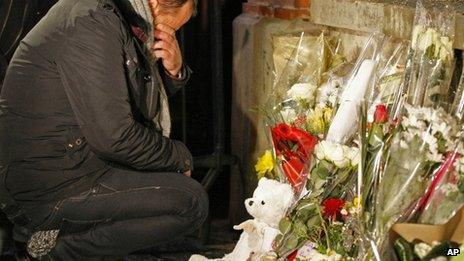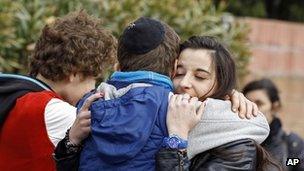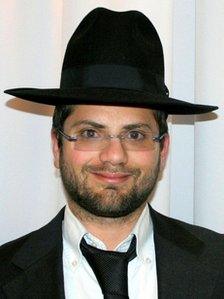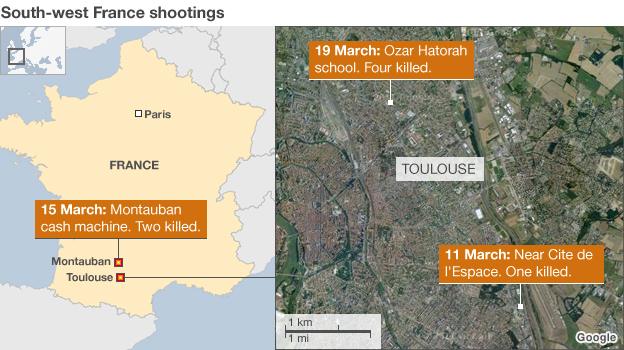Toulouse school shootings: Who was behind the attacks?
- Published

The killings sent shockwaves throughout France
One has to look back to a long bygone era to recall anti-Jewish attacks in France as lethal as the Toulouse school shooting.
Back in the 1970s and early 1980s, indiscriminate acts of terrorism against Jews were more common - the work mainly of extremist pro-Palestinian groups, such as Abu Nidal's.
But the last equivalent attack was in August 1982, when six people died in a gun and grenade assault in the Rue des Rosiers in Paris.
And even then, there was no question of children being deliberately targeted.
To the universal sense of horror at the Ozar Hatorah killings is thus added another element: utter bewilderment about what lies behind it.
Back in the former era, the motivation was clear enough. These were acts of terrorism carried out as an extension of the Middle East conflict.
The world may have disputed it, but the perpetrators certainly claimed to be political.

Eyewitnesses say the attacker shot at everyone "he had in front of him, children and adults"
Deranged far-rightwinger?
But what prompts a man to turn a .45 pistol on a three-year-old?
Or to pursue an eight-year-old girl into a schoolyard, and put a bullet in her head?
This was a killer in a completely different realm of hatred.
It may well turn out that he has a complex system of self-justification for all that he has done. But it also seems likely that psychologically he is deeply disturbed.
The questions will not be laid to rest until the man is caught. The biggest one is this: what is the link between the killings at the Jewish school and last week's attacks on French soldiers.
It is now established beyond doubt that the three incidents in Toulouse and Montauban were the work of the same man.
He used the same gun, rode the same 500cc Yamaha scooter, and acted with the same cold-blooded brutality.
But why the widely differing choice of targets: soldiers and Jewish children?

Jonathan Sandler was shot dead along with his two sons
One theory is that the man is a deranged far-rightwinger.
It is noted that the three dead soldiers were of North African origin, and a fourth who was injured is from the French Caribbean.
The killer has a clear affinity with guns. Could he be a neo-Nazi type - maybe an ex-soldier or a member of the criminal underworld - with a hatred of all minorities, Jews and Muslims?
Afghan factor?
Some have gone further - indirectly pointing the finger at President Nicolas Sarkozy for recently raising sensitive issues such as halal and kosher meat in the run-up to the presidential election.
This tactic, they say, gives credibility to the far-right and "delegitimises" the Muslim and Jewish communities.
The problem with this theory is that it is not yet established that the killer deliberately targeted Muslim soldiers.
He met his first victim after answering an online advertisement for a motorcycle in which the seller identified himself as a soldier, but did not give his (Arabic-sounding) name.
The two subsequent victims were in uniform, and though of North African origin, physically indistinguishable.
So it seems equally likely, if not more so, that the killer selected the targets simply because they were soldiers.
This does not rule out that he is a far-right fanatic, of course. He may also have a grudge against the armed forces.
But it does raise the possibility of a second theory: that the killer hates soldiers because of France's military presence in Afghanistan. So maybe - some are saying - he could be a deranged Islamist, which would also explain his hatred of Jews.
Matter of time
Just beginning this train of thought reveals how sensitive the matter is.
Politicians, police and media commentators have all warned that speculating about the motivation of the killer is extremely dangerous - and they are right.
With the elections approaching, different political camps have different political agendas - and different reasons to hope that this or that theory will prove to have been the right one.
Better, surely, just to wait.
With one of the biggest manhunts in French history under way, it can only be a matter of time.

- Published16 March 2012
- Published15 March 2012